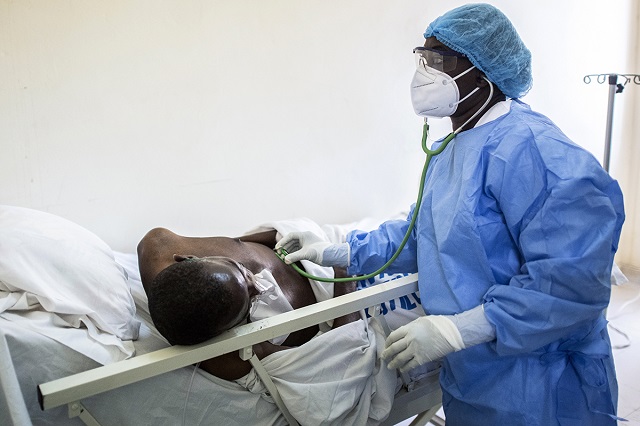
Kampala, Uganda | THE INDEPENDENT | More than 10 doctors who have suffered from severe forms of COVID-19 have been forced to seek care from private hospitals. This is due to the lack of ICU beds in government hospitals.
According to the Uganda Medical Association-UMA, their colleagues who on average earn 5 Million Shillings per month are being forced to go to private hospitals where some private hospitals charge between 3-5 Million Shillings per day. Some of the hospitals include Victoria and Novik.
With some patients spending more than eight days in ICUs, doctors have to pay as much as 40 Million Shillings.
Medical personnel who cannot afford private care or delay being rushed to a private hospital succumb to the disease. Last week, Dr Charles Kiggundu succumbed to the disease because there were no available ICU beds.
Dr Richard Idro, the UMA President says that Mulago and Naguru hospital ICUs are full and cannot admit any more patients.
“Right now, there are no free ICU beds. High dependency wards are full. They are all full and doctors who are falling sick are either being forced to remain in their homes or are going to private hospitals where they are being forced to pay a lot of money to get care,” Dr Idro said.
As of yesterday, over 1,744 health workers had been infected with COVID-19. 17 have succumbed to the disease.
According to the ministry of health, 143 beds have been installed in all 14 regional hospitals, and are functional. In Kampala, over 30 ICU beds have been installed. However, regional hospitals at the moment claim not to have functional ICUs.
Gulu Regional referral hospital that received ICU equipment in September 2020 does not have a functional ICU. According to the hospital staff, while the hospital received 10 ICU beds, five ventilators and ox meter concentrators, none is being used.
Dr Paska Apiyo, the in-charge of the COVID-19 treatment unit at Gulu Regional Referral Hospital says some staff members infected with the disease need to be admitted to the ICU ward. However, they could not because the equipment they received is not working.
She adds that due to a lack of non-operating equipment, they are forced to work closely with staff from St Mary’s Lacor hospital which has some equipment. However, she says when it comes to severe cases, they refer patients to Mulago.
Other regional referral hospitals like Mbale and Arua received equipment, but it has not yet been installed, and staff have not yet been trained on how to use the equipment. Patients that need to be admitted to the ICU are referred to hospitals in Kampala that might have some free functional ICU beds.
Dr Rose Byanyima, the Deputy Director of Mulago National Referral Hospital and the COVID-19 treatment in charge refused to comment on whether the ICU was full or not.
She however urged the public to follow the right referral process. She says people need to let doctors do their work instead of putting them on pressure.
Idro says not only doctors are being infected but all staff in hospitals. He says people like cleaners in hospitals cannot afford 3 Million Shillings to seek care in private hospitals.
Idro wants the government to increase the bed capacity at COVID treatment facilities.
“Many people need ICU beds and we cannot expect teams there to remove a patient from a ventilator to give it to a doctor. That is inhumane. The only solution now is for the government to increase the capacity of high dependency units. They have promised to increase bed capacity countrywide by 1,000 beds. But they have not. We are still on the bed capacity we had when we only had 10 confirmed patients and this is affecting the odds of recovery from the disease,” he explained.
Dr Frank Assiime, the in-charge of welfare at UMA says the government should have increased its bed capacity months ago. He says the government’s preparations during the nationwide lockdown that lasted more than three months were not enough.
Emmanuel Ainebyoona, the senior public relations officer at the ministry of health says the ministry is increasing bed capacity.
“The process is on-going to increase bed capacity. We have some beds that were donated and right now we are working on preparing space where they can be fitted in hospitals,” he said.
Doctors however say most of the donated beds are general ward beds and cannot be used in a high dependency unit where specialized beds have electronic features that can operate both the bed and nearby electronic devices. They argue that the ministry needs to buy the right kind of beds and also prioritize the care of health workers.
“Health workers are very important people. If they are not there, who will manage the COVID patients. If they die because they cannot access cheap medical care, who will look after the sick? The government needs to provide wards to cater to medical workers so that they can do their work,” Dr Idro said.
*****
URN
 The Independent Uganda: You get the Truth we Pay the Price
The Independent Uganda: You get the Truth we Pay the Price



